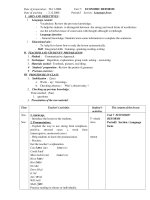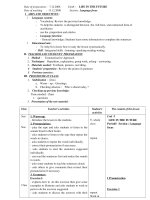English 12 unit 1 language focus
Bạn đang xem bản rút gọn của tài liệu. Xem và tải ngay bản đầy đủ của tài liệu tại đây (1.36 MB, 31 trang )
MARIE CURIE SECONDARY
SCHOOL
TEACHER: LE THI QUYEN
What are they ?
bats
What are they ?
bags
What are they ?
toys
What are they ?
flies
What are they ?
cats
What are they ?
beds
What are they ?
•
bats
•
bags
•
toys
•
flies
•
cats
•
beds
“s” or “z”
?
I. Pronunciation of the ending ‘s’
II. Grammar: Tense Revision
1. Listen and repeat
bats
kits
speaks
dates
photographs
bags
kids
speeds
days
halves
/s/ /z/
/bæts/
/spi:ks/
/kits/
/deits/
/'foutəgr :fs/ɑ
/bægz/
/kidz/
/spi:dz/
/deiz/
/h :vz/ɑ
I. Pronunciation of the ending ‘s’
2. Practice reading these sentences
1. I saw some bats flying from the bags.
2. He often speaks at different speeds.
3. She tore the photographs into halves.
4. I always have the dates on rainy days.
5. The kids are playing with their toy kits.
/bæts/
/bægz/
/spi:ks/ /spi:dz/
/'foutəgr :fs/ɑ
/h :vz/ɑ
/deits/ /deiz/
/kidz/ /kits/
1. Past simple
3. Present perfect
2. Past progressive
E.g. : What did he do?
1. Past Simple
l
a
s
t
n
i
g
h
t
2 days ago
yesterday
What did you do yesterday ?
1. Past Simple
GRAMMAR: TENSE REVISION
1. Past simple
-
Hành động diễn ra và chấm dứt trong quá khứ, không liên quan
đến hiện tại
a. E.g. : - What did he do yesterday?
- He watched television yesterday.
- He did his homework last night.
- He went to the cinema 2 days ago.
(+) S + V- ed / irregular V (cột 2)
(-) S + didn’t + V (nguyên thể)
(?) Did + S + V (nguyên thể) ?
Yes, S + did // No, S + didn’t
c. Signal words:
Yesterday (morning/afternoon/evening);
Last (night/week/month/year/decade (thập kỷ)/ century (thế kỷ);
2 minutes/hours/days/months… ago; in 2010; in June 2011
b. Form:
d. Usage:
E.g. : What were they doing at 7 p.m. yesterday ?
They were having dinner.
She was walking along street.
2. Past Progressive
What were you doing at 7 p.m. yesterday ?
2. Past Progressive
E.g. : What were they doing when he came/knocked at the
door last Sunday?
They were watching television when he came.
2. Past Progressive
E.g. : What were they doing at 6 p.m. yesterday?
She was listening to music while he was reading books.
2. Past Progressive
GRAMMAR: TENSE REVISION
2. Past progressive
-
Hành động diễn ra tại một thời điểm nhất định trong quá khứ.
-
Hành động đang xảy ra thì một hành động khác xen vào.
-
Hai hành động xảy ra song song tại một thời điểm trong quá khứ.
a. E.g. : - They were having dinner at 7 p.m. yesterday.
-When he came, they were watching television.
- She was listening to music while he was reading books at 6 p.m. yesterday.
(+) S + was/were + V- ing
(-) S + was/ were not + V- ing
(?) Was/ were + S + V-ing?
Yes, S + was/ were // No, S + was/ were not
c. Signal words:
At (5 pm…) + yesterday/last (Sunday, morning…);
When…(she came/ the phone rang…)
… while…
b. Form:
d. Usage:
E.g.: Have you been to… ?
H
a
L
o
n
g
b
a
y
A
m
e
r
i
c
a
H
o
C
h
i
M
i
n
h
C
i
t
y
3. Present Perfect
E.g.: How long have you studied English?
“We have studied
English for 6 years.”
3. Present Perfect
E.g.: Have you finished your homework yet?
“No, I haven’t.”
3. Present Perfect
GRAMMAR: TENSE REVISION
3. Present perfect
-
Hành động xảy ra trong quá khứ nhưng kết quả còn ở hiện tại. Hay đi
với các từ: already, just, (not) ……yet, recently, lastly…
-
Hành động kéo dài từ trong quá khứ đến hiện tại thì được khoảng thời
gian là bao lâu và có thể còn tiếp tục sau hiện tại. Hay đi với các từ: in the
last few days , so far , since breakfast/I was a child, for 2 years…
-
Nói về trải nghiệm hay kinh nghiệm trong cuộc sống đã từng làm gì hay
chưa. Hay đi với các từ: ever, never, the first/second/ third time…
a. E.g.: - The students have already finished their homework.
- We have studied English for six years/ since we were in 6 grade.
- Have you ever been to Ho Chi Minh city (in your life/since you were born)?
(+) S + have/ has + V- ed/ irregular V (cột 3)
(-) S + have/ has not + V –ed/ irregular V (cột 3)
(?) Have/Has + S + V–ed/ irregular V (cột 3)?
Yes, S + have/has // No, S + have/ has not
b. Form:
c. Usage and signal words:









